Learn how to do keyword research step-by-step. Discover tools, competitor strategies, and content planning tips to boost your SEO and traffic.
Best SEO Tools



Search Engine Optimisation (SEO) is important if you want your website to have maximum exposure online.
However, it’s not exactly the easiest or fastest process to undertake when you don’t have the best SEO tools at your disposal.
Without SEO software tools, such as rank tracking, you'll be force to do a lot of your SEO work manually which is very time consuming.
At Digital Treasury, our SEO experts use a wide range of tried and tested SEO tools to speed up our workflows. So we know the ones that work the best for getting your website to rank #1 on search engine results pages (SERPs).
That’s why we have compiled this guide for the best SEO tools that will help you get your website ranking below.
Before you find the best SEO tools, we strongly recommend you check out this technical SEO checklist for beginners and experts, to make sure you're ready, as well as the best chrome extensions for SEO.
The Best SEO Tools
Now to the moment of truth.
Here are some impressive SEO tools that we have used at Digital Treasury.
They each serve different purposes, containing various tools that anybody looking to improve their SEO needs.
Sitechecker
If you're looking to quickly and comprehensively improve the SEO of your website, Sitechecker is a great tool to have in your belt. This website allows you to generate a complete SEO report that contains a detailed audit of your site, ranking details, steps you can take to improve your SEO and even backlink tracking as well.
Additionally, Sitechecker is optimised for web browsers, with seamless integration for Google Analytics and Google Search Console. You can easily perform fast on-page checks and get all of the information you need.

Ahrefs
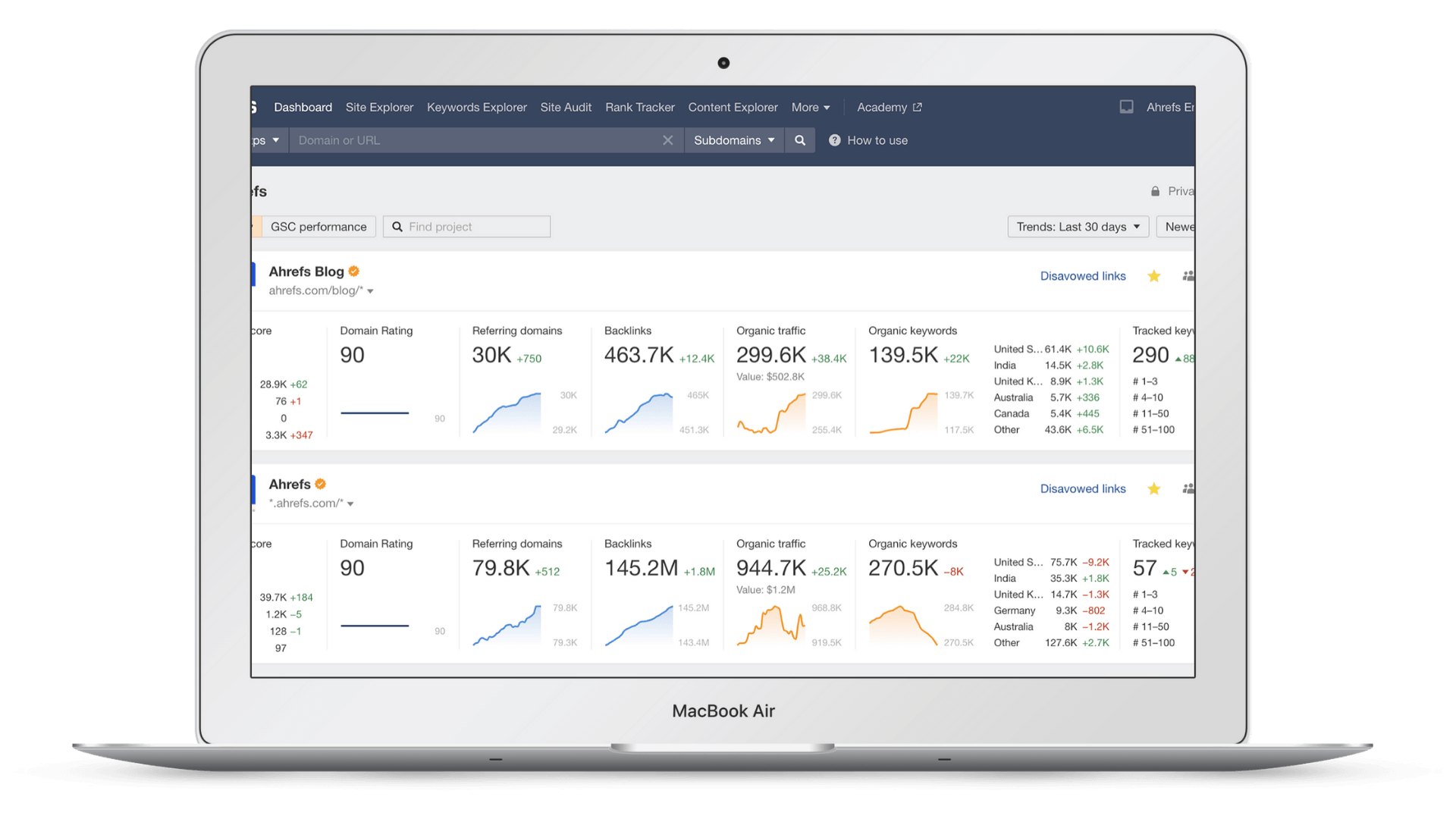
Ahrefs is a piece of SEO software that bills itself as an all-in-one toolset that allows you to audit and optimise your website, analyse your competitors, find keywords your customers are searching for, learn from your industry’s top performing content and track your ranking progress.
Regardless of your role in SEO, whether you’re; an SEO professional, content marketer, blogger, part of an agency, specialising in SaaS or ecommerce, ahrefs is a toolset that has been designed to be easy to use.
Google Search Console

Google Search Console is Google’s own SEO toolset. Search Console tools and reports help you measure your site's search traffic and performance, fix issues, and make your site rank higher in Google Search results.
Search analytics help you optimise your content with search analytics, you can submit your individual URLs straight to Google for crawling, you can get alerted on issues that Google identifies with your website and you can inspect detailed crawl, index, and serving information about your pages, directly from the Google index.
Additionally, you can:
- Monitor, test, and track your AMP pages with Search Console tools and reports
- Test and improve your site’s mobile usability with customised reports
- Monitor and improve your recipes, jobs, or other structured data which appears as rich results on Google Search, using search console reports
SEMRush
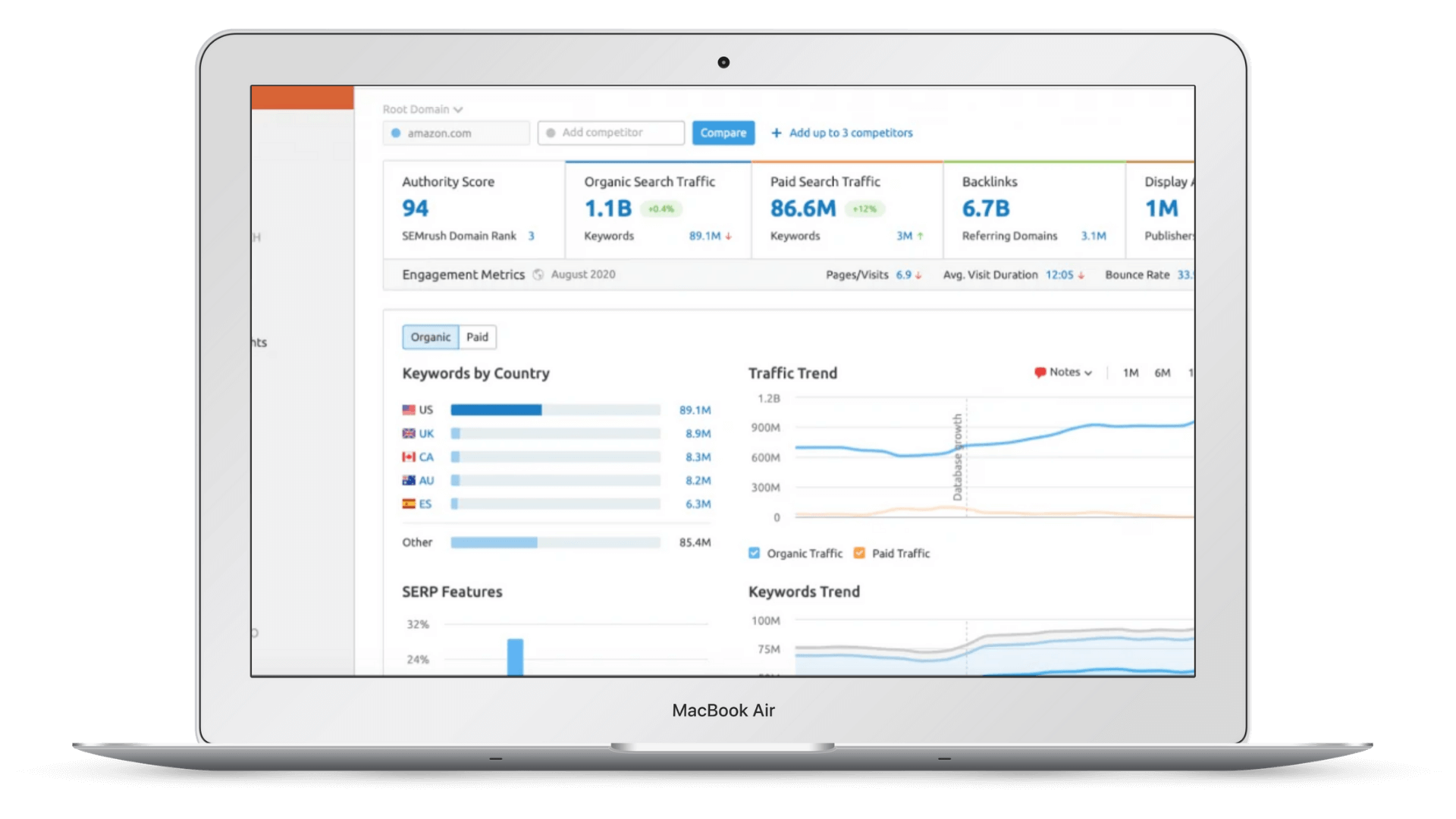
Semrush is a SaaS platform often used for keyword research and online ranking data, including metrics such as search volume and cost per click. The platform also collects information about online keywords gathered from Google and Bing search engines.
This platform contains various tools that allow you to:
- Grow organic traffic using their complete and easy SEO tools and workflow
- Create content that ranks using their topic research and writing assistant
- Identify competitors’ marketing strategy and techniques
- Discover how to advertise more effectively with their advertising research and keyword gap tool
- Build an effective social media strategy with their social media toolkit
- Streamline your agency processes for growth
KWFinder

KWFinder is a keyword research tool for search marketing. It meets the need for keyword expansion: generating more keywords to position a site on. It provides a proprietary index value for SEO difficulty and insight into the competitive landscape in pay-per-click (PPC) advertising.
Using the keyword tools provided by KWFinder, it is possible to easily;
- Find keywords that you can easily rank for with low SEO difficulty and high search volume
- See what keywords your competitors rank for using their domain or URL
- Get search volumes with historical data, so that you can create content based on historical search volumes and long-term trends
- Find location-specific long tail keywords for your website
Moz Pro
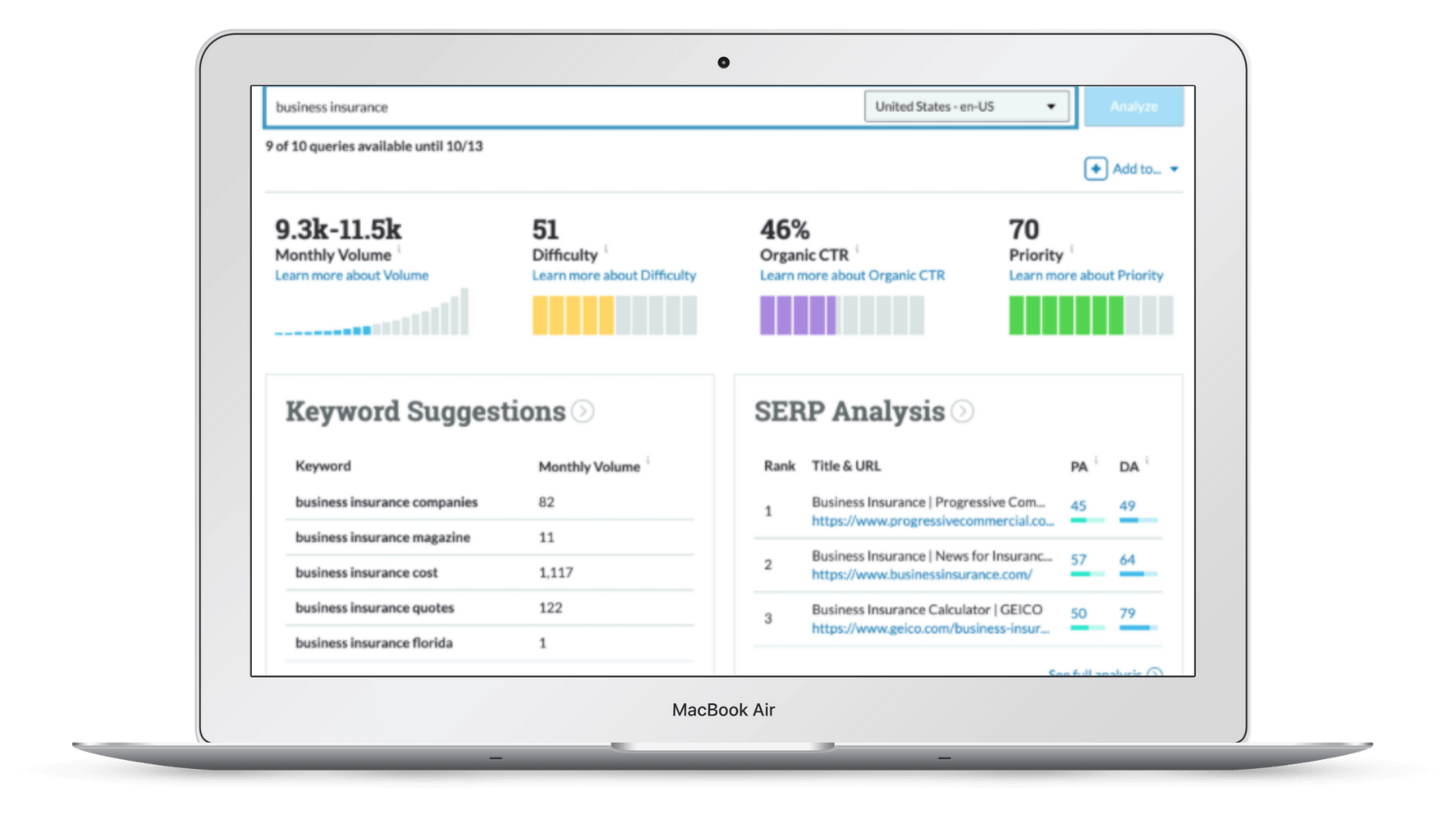
Moz Pro is a complete SEO toolset that helps boost your rankings and search engine visibility. It deciphers website errors, competitive research and SEO opportunities, responding with actionable insights that will help your website rank higher on SERPs.
With Moz Pro, you can see if your campaign is working for your audience. It allows you to track how you rank for certain keywords. You’ll also see how you rank for certain keywords compared to your competition. It crawls your site to look for errors and report the errors as soon as it finds them. This allows you to fix errors quickly and efficiently. Moz Pro also offers features like page optimization and link opportunities. They offer numerous tools to help your SEO plan succeed.
Ubersuggest
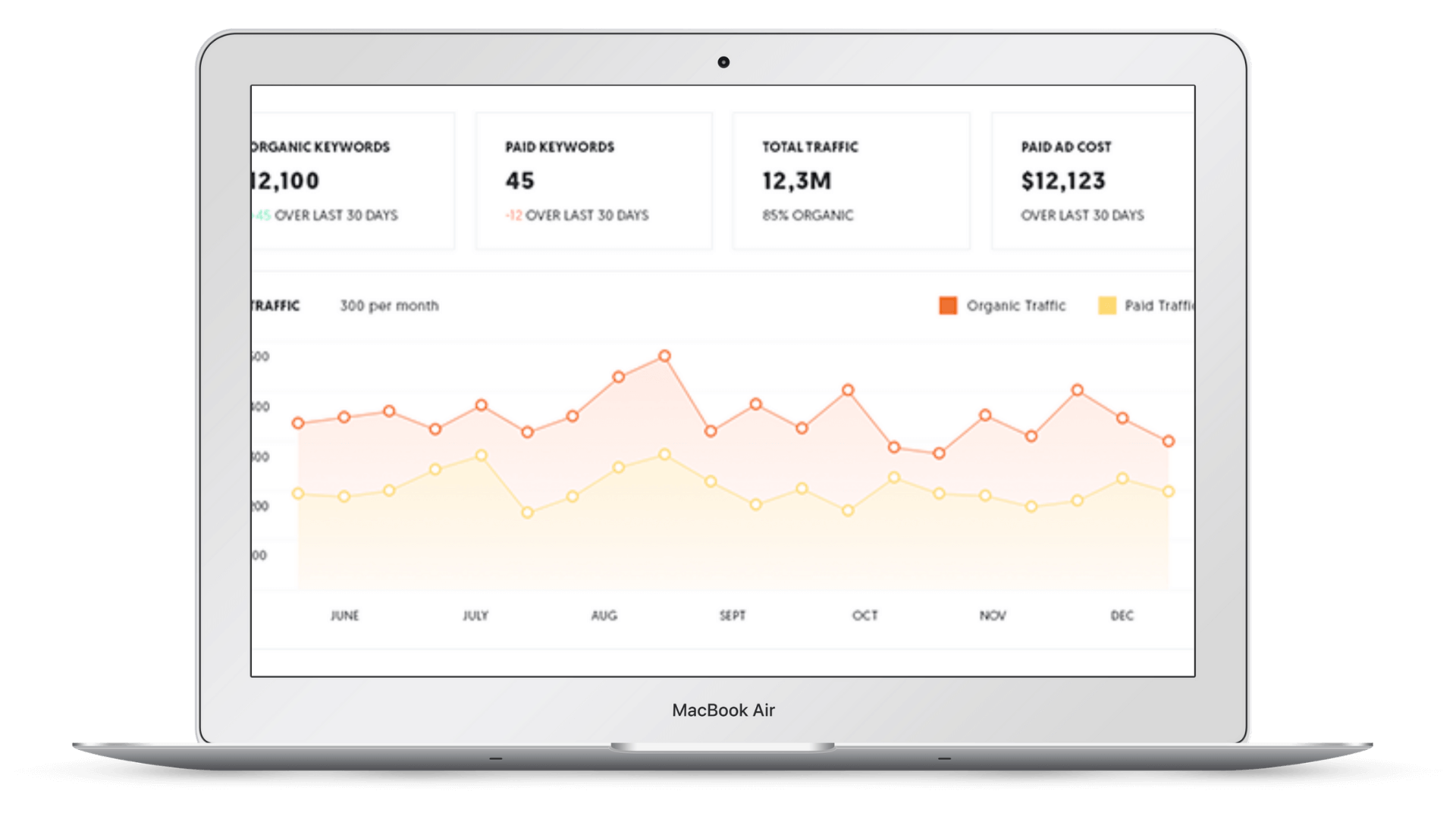
Ubersuggest is a free SEO tool that specialises in generating new keyword ideas. It has a wide variety of features, including:
- Keyword ideas to see keywords related to the one you originally searched for.
- A content section that will show you what kind of blogs or social media posts people are looking at which are related to your keyword. You can see how many shares they’ve had on different platforms, how many backlinks those posts or blogs have, and what sort of traffic they’re getting.
- The ability to see how the website is performing in terms of its overall domain score, keywords and backlinks.
- A keyword analyser that lets you know which keywords a domain is targeting and the monthly search volumes they achieve. Again, you can use this to your advantage and be very precise about which keywords you are going to target.
- A site auditor that will break down any issues your website may be facing when it comes to generating SEO traffic and will prioritise recommendations on what to focus on first, based upon which fixes will give the biggest increase to your traffic.
Answer The Public
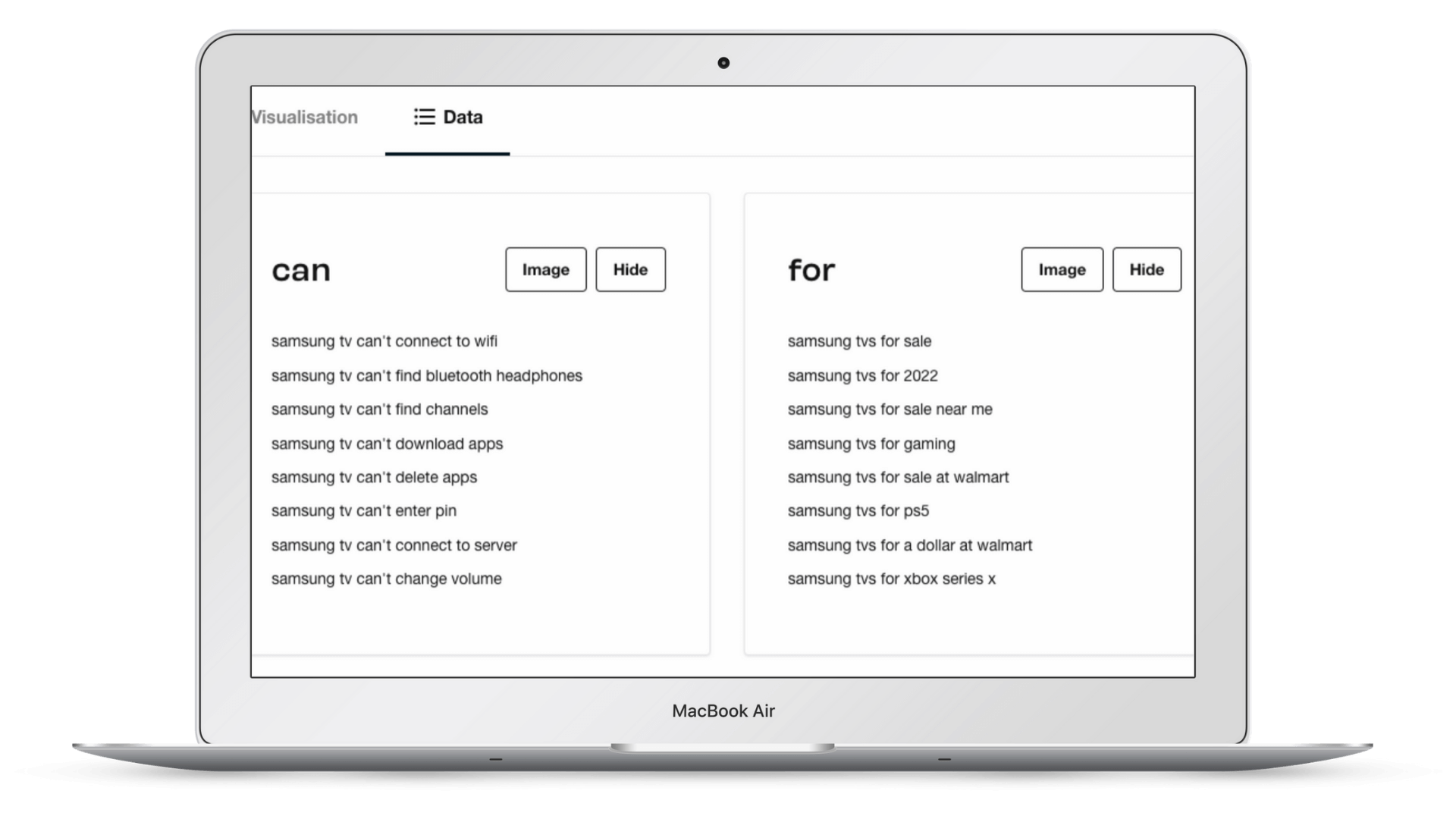
Answer The Public is a keyword tool that visualises search questions and suggests autocomplete searches in an image called a search cloud. Categories consist of the 5 Ws (who, where, what, why and when) plus ‘how’, ‘can’, ‘are’, ‘which’ and ‘will’.
These data visualisations help you grow traffic, narrow down the right keywords for paid traffic, optimise for organic traffic, get featured on Google snippets and increase landing page conversions. With the right keyword research and tools, you can tap into what your potential customers are searching for and direct them to your page through well-crafted ads and content. As a bonus, it can also help inform your content strategy, improve the copy on your landing pages and more.
SpyFu
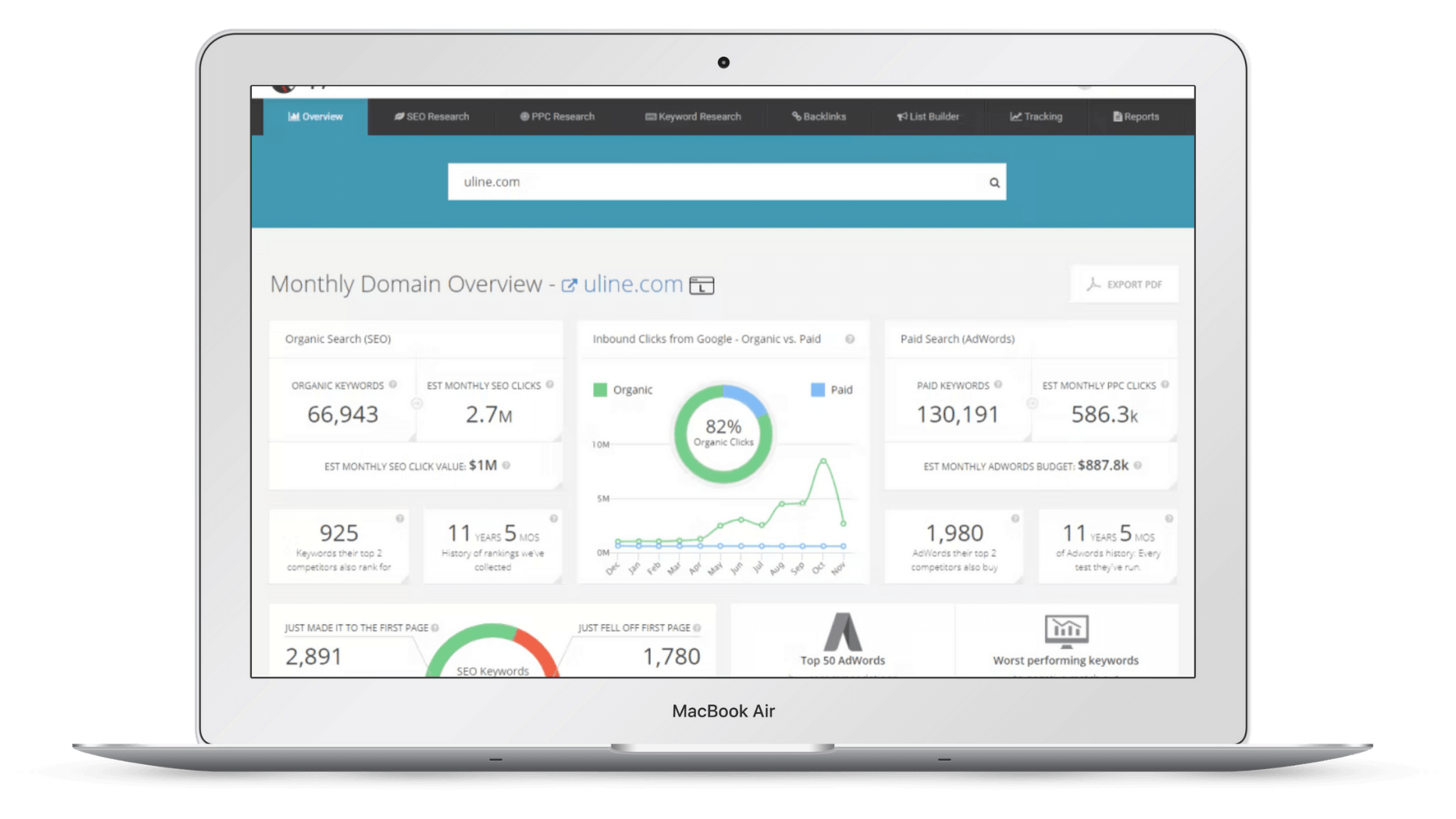
SpyFu aims to assist users in improving their SEO (search engine optimization) and advertising strategies by exposing their competitors’ tactics. Unlimited domain, keyword and backlink searches, backlink results, and data exports allow users access to extensive data available on their competitors, and also their own sites.
By collating the most successful AdWords ads of users' selected competitors, SpyFu's AdWords advisor reports provide campaign-specific keyword suggestions. By comparing three domains in three ways, advertisers are able to see which keywords are being used across each site, which keywords are shared between two sites, and which keywords are unique to each individual user.
A user can also create lists of companies to contact, based on factors like location, ad spending, and paid keywords, and access contact information including phone numbers, e-mail addresses, and details about the technology they use currently.
Woorank

Woorank is an online website auditing tool that identifies the SEO performance of your website, including strengths that boost its ranking, as well as any problems that you might have not noticed before. You type in the URL of a website and it presents you with a detailed SEO audit for all the important ranking factors. If you try to do that process manually, it will take you a lot of hours. However, if you use WooRank for free, you have these details in a few seconds.
Also, you can connect your account to Google Search, Google Analytics, and your Facebook page as well to get the best possible results while it analyzes every page of your site separately or tracks your keywords.
Majestic
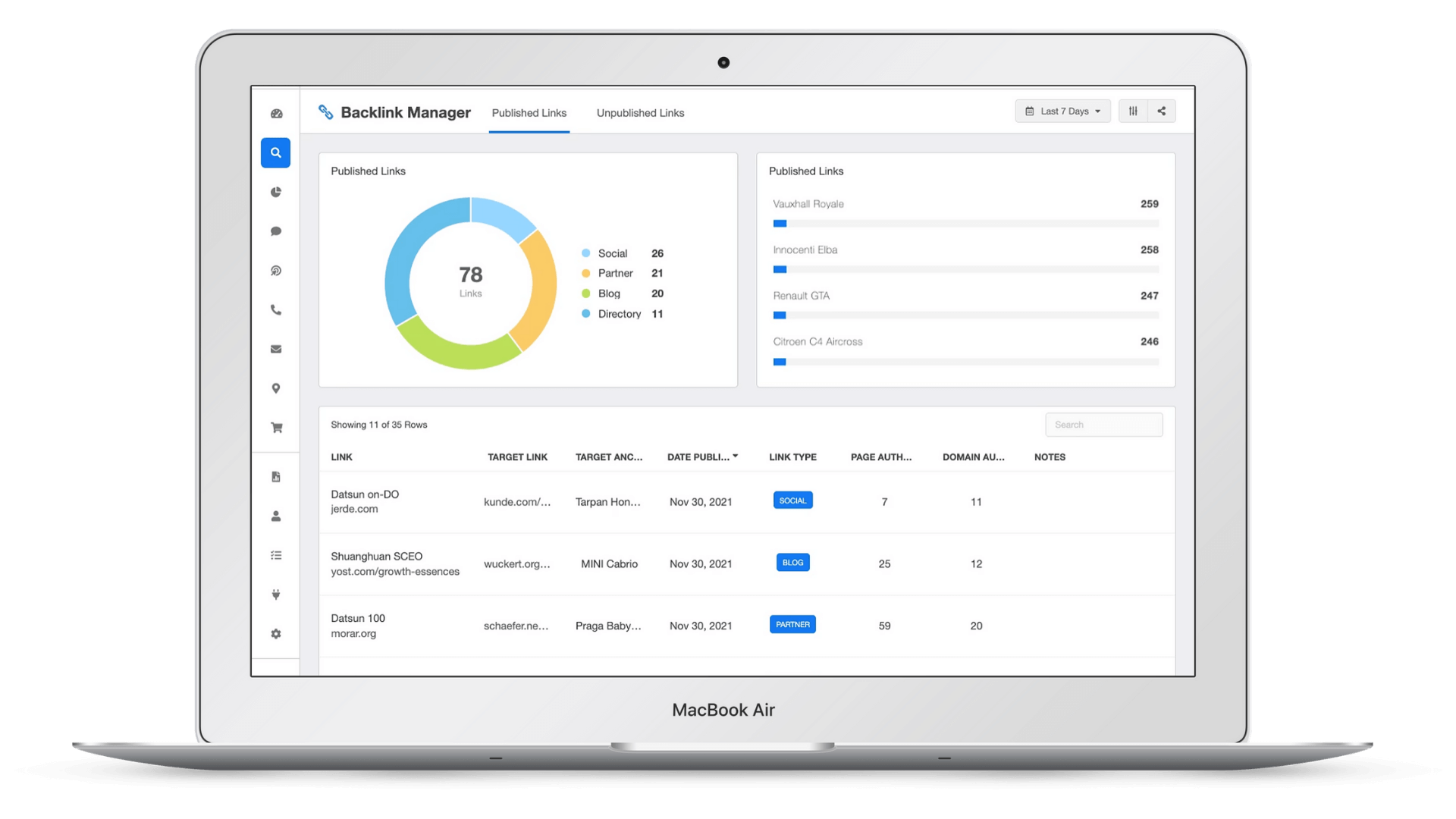
Majestic SEO is an SEO software tool that specialises in link analysis. So unlike Ahrefs, SEMrush or Moz Pro, Majestic is not an all-in-one SEO tool and only focuses on whoever links back to your website.
Majestic allows you to measure and view a wide range of backlink related metrics, including:
- Trust Flow
- Citation Flow
- Topical Trust Flow
- External Backlinks
- Referring Domains
- Referring IP Addresses
- Crawled URLs
- Indexed URLs
From there, you can generate reports and visualise data that demonstrates the quality of your links. If your backlinks are from quality sites, then your website’s perceived value in the eyes of the Google algorithm will be raised, thus ranking it higher on the SERP.
Google Trends

Google Trends is a website by Google that analyzes the popularity of top search queries in Google Search across various regions and languages. The website uses graphs to compare the search volume of different queries over time.
There are two samples of Google Trends data that can be accessed:
- Real-time data is a sample covering the last seven days.
- Non-realtime data is a separate sample from real-time data and goes as far back as 2004 and up to 36 hours before your search.
It is possible to use this data to find keywords that you should be targeting, as they relate to both your websites and your competitors.
SEOQuake
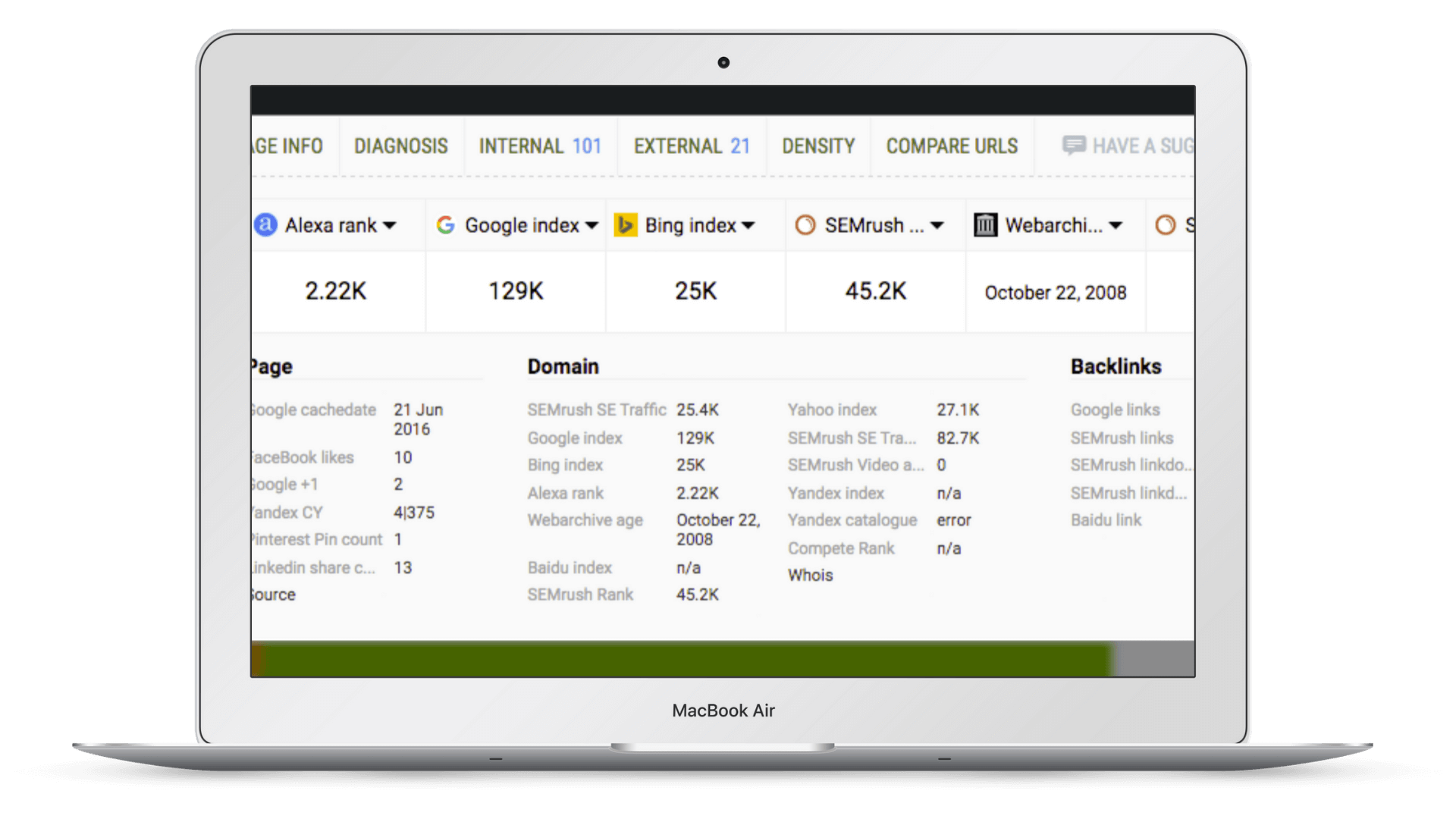
SEOquake is a free plugin for your browser that provides you with organic search data at the click of a button. Currently compatible with Mozilla Firefox, Google Chrome and Opera, SEOquake can provide parameters about the listings on a search engine results page.
Using SEOquake is a great way to improve your website's SEO ranking. It is easy to use and provides valuable information about your website's SEO health in a very fast timeframe that allows it to stand out from a lot of the other tools in this list.
Siteliner
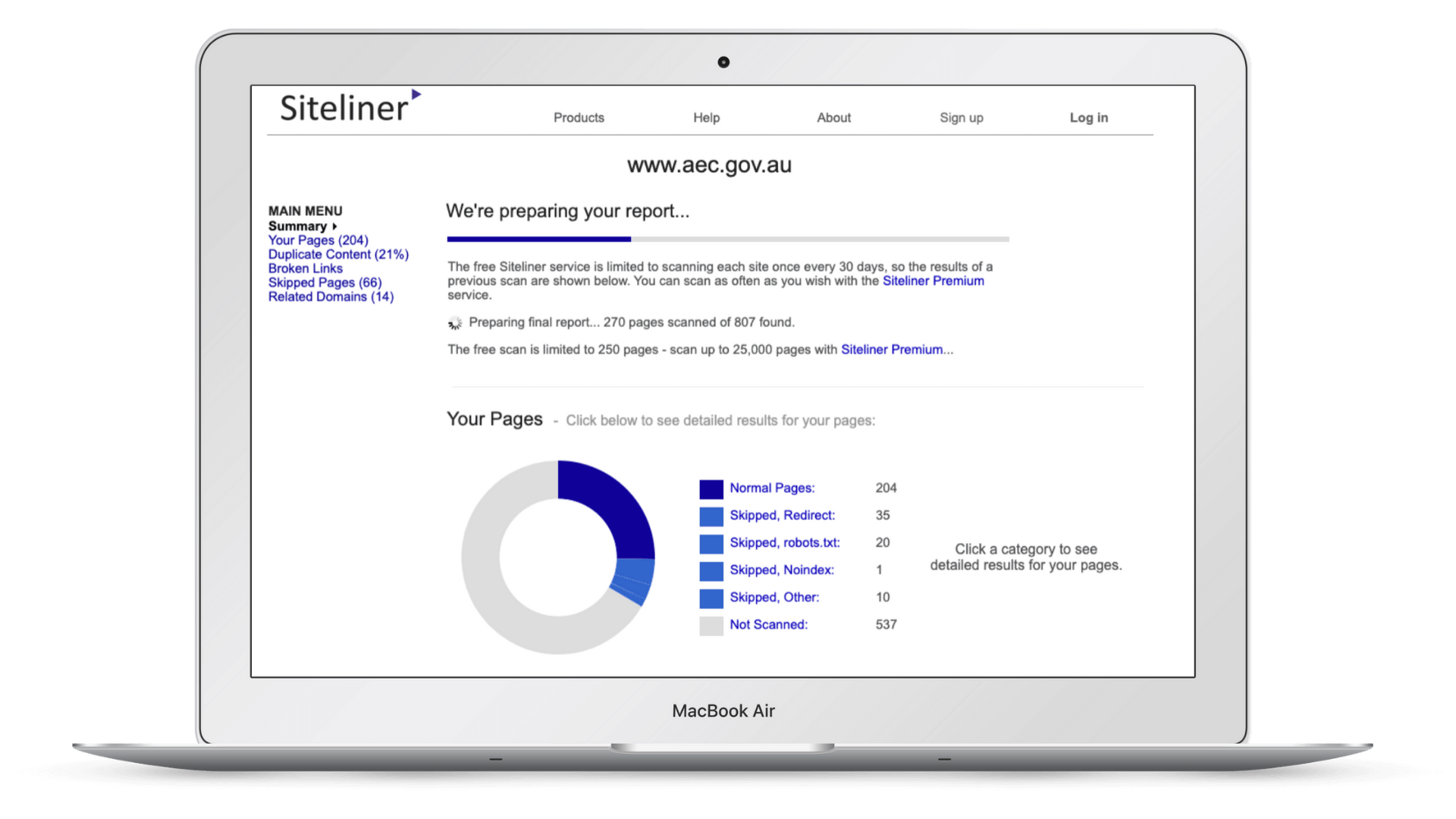
Siteliner is a free service that lets you explore your website, revealing key issues that affect your site's quality and search engine rankings.
These key issues include:
- Duplicate Content - Duplicate content can lower your site's search engine rankings, reducing the traffic to your site. Siteliner systematically checks your site for internal duplicate content, highlighting it on each page, intelligently excluding common content such as menus and navigation.
- Broken Links - Broken links can damage your site's user experience and lower your site's search engine rankings. Siteliner checks all internal links on your site to ensure they are working, and highlights the broken links so you can fix them easily.
- Page Power - Siteliner identifies the pages that are most prominent to search engines as they crawl through your site based on the link patterns between your pages.
- Reports - Siteliner crawls and analyzes the pages on your site, revealing key information about each page. Siteliner provides a standard XML Sitemap for your site, as well as a more detailed Siteliner Report.
The types of SEO
SEO is not a singular linear process. It consists of various components that different SEO tools address. That’s why, before we start naming tools (which, without proper context, will just be confusing and unhelpful) we will start by going over what the different types of SEO are.
There are three types of SEO; on page SEO, technical SEO and off-site SEO. These types take the various actions that go into SEO and categorise them based on the location that their effect takes place (i.e. the front end of your website, the back end of your website and beyond).
On-Page SEO
On-page SEO is the process where you optimise the content on individual pages and blog posts so that your website ranks higher and receives more relevant traffic in search engines.
On-page SEO concerns the following:
- Keyword Research, as you want your content to target high ranking keywords that are relevant to both you and your competitors.
- Content Creation, as you want the content on your website to be high quality and relevant to your users, resulting in higher organic traffic and a lower bounce rate
- Keyword Optimisation, as you want to place keywords in a way that is recognisable to Google’s algorithm without detracting from how authentic your blog reads to your users.
Technical SEO
Technical SEO involves the technical aspects of the website and how they aid your ranking in the SERP. Many make the mistake of focusing too much on on-page SEO while neglecting their technical SEO, meaning they are putting a huge amount of misguided effort into a website that won’t rank.
Technical SEO means optimising the following on your website:
- Site Speed, eliminating wait times that will cause potential users to click away, resulting in a higher bounce rate
- Mobile Friendliness, ensuring that your website functions perfectly on other devices
- Indexing and crawlability, making sure that search engines can easily crawl your web pages for keywords and metadata that tell it where to rank your website on their SERP
- Site Architecture, making your website easy to navigate for users by ensuring that pages follow a logical flow
- Structured Data, so that search engines understand what your website is about, so they can ensure it is found by the right people
- Security, to ensure that your website isn’t susceptible to vulnerabilities that will affect its ability to rank
Off-Site SEO
Off-site SEO involves elements that are outside of your website, yet they also aid SEO rankability.
These include various elements such as:
- Backlinks, in which getting reputable websites to link back to you will boost your SEO ranking
- Trust, such as having domain authority (over a specific subject area or industry), a SSL certificate and a good reputation amongst your users
- Personal, where your country, locality, history and social presence also play a determining role in your SEO ranking
What are SEO Tools?
The purpose of SEO tools is to determine whether or not a website is likely to rank high on search engine ranking pages (SERPs), providing information on backlinks, keywords and insights into SEO competition.
SEO tools analyse different website metrics, such as:
- Keywords that are related to your website, used by competitors and frequent in your users queries.
- Content that contains keywords in their titles, descriptions and/or tags, and is also interesting, relevant and unique.
- Domains that have keywords in their URL.
- The ranking of both websites and their individual pages.
- The flow of traffic from external sources to your website i.e. how often users visit your website, where they come from and how they navigate through your pages.
- Data from social media pages that are associated with your website, including Facebook and Twitter
Why are SEO Tools Important?
The best SEO tools are important for a wide variety of reasons that allow you to boost your website’s SEO rankings as well as be more effective in general.
For example, SEO tools allow you to identify the SEO strategies employed by your competitors. Not only can you see their traffic numbers and rankings, but identify where their backlinks are coming from and how their content is performing across platforms.
Additionally, you can use crawling tools to identify any potential issues with your website that could negatively affect rankings, such as;
- Orphaned pages
- Missing page titles
- Missing meta descriptions
- Broken links
- Poor page depth
- Page server errors
You can find high converting keywords based on all kinds of queries associated with your users; whether they are looking for free information, a solution to their problem or a product to purchase.
There are also SEO tools for tracking your progress and KPIs, which can be from a wide range of metrics such as:
- Keyword rankings
- Domain authority
- Number of backlinks
- Traffic
- Form fills
- Sales
- Shares
- Clicks
- Social media comments
Finally, you can visualise your SEO data, which allows you to communicate a clear return on investment to your clients. SEO tools make it easy to present which aspects of your websites are succeeding, resulting in an increase in traffic as well as sales.
All of these goals are made infinitely easier to achieve through the use of SEO tools. There is no reason not to use these software solutions.
Summary
Because SEO is difficult to do without the right tools, we have created a guide to help you find the best SEO tools. These cover different types of SEO, including;
- On-page SEO, where you optimise the content on individual pages and blog posts so that your website ranks higher and receives more relevant traffic in search engines.
- Technical SEO, which involves the technical aspects of the website and how they aid your ranking in the SERP.
- Off-site SEO, which involves elements that are outside of your website, yet they also aid SEO rankability.
These tools are important because they help you identify weaknesses in your website and content, while also providing you with strategies to improve your ranking. We listed the following tools:
- Ahrefs
- Google Search Console
- SEMRush
- KWFinder
- Moz Pro
- Ubersuggest
- Answer The Public
- SpyFu
- Woorank
- Majestic
- Google Trends
- SEOQuake
- Siteliner
Would you like more details on the best seo tools for your website? Contact us to learn more.
Latest blogs &
articles
Yes, we can provide case studies and examples of our previous work. Potential clients frequently request these to see concrete evidence of our past successes. They want to understand how we’ve helped similar businesses achieve their goals through SEO and website development. Our case studies typically highlight our clients’ challenges, the strategies we implemented, and the measurable results we achieved, such as increased traffic and higher conversion rates. This builds trust and demonstrates our ability to deliver on our promises.
Post-launch support is crucial for maintaining website performance and security. Clients want to know if the company provides:
Regular Updates: Ensuring the website remains up-to-date with the latest software versions and security patches.
Technical Support: Assisting with any issues that arise, such as bugs or downtime.
Content Updates: Offering services to update or add new content as the business evolves.
Performance Monitoring: We regularly check the site’s speed, uptime, and other critical metrics to ensure optimal performance. This ongoing support provides peace of mind, ensuring that the client’s website remains effective and secure over time.
SEO (Search Engine Optimisation) is a digital marketing approach focused on boosting your website’s presence on search engines like Google, Bing, and Yahoo. By refining different elements of your site—such as content, meta descriptions, and backlinks—SEO works to improve your website’s position in search engine results. This increased visibility is vital as it attracts more organic traffic, potentially leading to a rise in leads, sales, and overall business success. Businesses frequently discuss the basics of SEO, its importance in attracting targeted visitors, and how it supports wider business goals.
SEO is a strategy that requires a long-term commitment, and it's essential to have realistic expectations from the outset. Typically, businesses may notice significant improvements within 3 to 6 months. However, this can differ depending on factors such as the level of competition, the industry, and the website's current condition. While addressing technical issues can result in some early successes, meaningful increases in rankings and traffic usually develop over time. Clients often ask for a clear timeline to gauge when they might start seeing a return on their investment (ROI).
Website Audit and Analysis: Conduct a thorough evaluation of the site to pinpoint strengths, weaknesses, and areas that can be enhanced.
Keyword Research: Identify relevant keywords that your potential customers actively search.
On-Page Optimisation: Improving various on-page elements such as meta tags, headers, content, and internal linking to increase site effectiveness.
Content Development: Crafting high-quality, engaging content tailored to the needs of your target audience.
Link Building: Securing backlinks from credible websites to enhance the site's domain authority.
Technical SEO:Ensuring the website is technically robust, with fast loading speeds, mobile responsiveness, and secure connections.
Ongoing Monitoring and Adjustment: Regularly track performance and make necessary adjustments based on data and trends. Clients ask about these steps to ensure they are investing in a thorough and effective SEO strategy.
Success in SEO is measured through a variety of Key Performance Indicators (KPIs), including:
Organic Traffic: The number of visitors coming to the website from search engines.
Keyword Rankings: The position of targeted keywords in search engine results pages (SERPs).
Conversion Rates: The percentage of visitors who take desired actions (e.g., filling out a form, making a purchase)
.Bounce Rate: The percentage of visitors who leave the site after viewing only one page.
Domain Authority: A score that predicts how well a website will rank in SERPs based on factors like link quality.
ROI (Return on Investment): Evaluating the financial return from SEO activities in comparison to the cost. Clients want to understand these metrics to gauge the effectiveness and profitability of their SEO investments.
SEO is an ever-evolving field, with search engines like Google regularly updating their algorithms. We make it a priority to stay ahead of these changes.This might involve:
Continuous Learning: Attending industry conferences, webinars, and training sessions.
Membership in Professional Organisations: Being part of SEO communities or organisations that provide the latest insights.
Regular Testing and Experimentation: Consistently testing new strategies and adapting to changes in algorithms.Industry Research: Staying informed with the latest studies, white papers, and expert opinions in the digital marketing sector.We are confident that our SEO strategies are current and that we are proactive in adopting best practices.
Post-launch support is crucial for maintaining website performance and security. Clients want to know if the company provides:
Regular Updates: Ensuring the website remains up-to-date with the latest software versions and security patches.
Technical Support: Assisting with any issues that arise, such as bugs or downtime.
Content Updates: Offering services to update or add new content as the business evolves.
Performance Monitoring: We regularly check the site’s speed, uptime, and other critical metrics to ensure optimal performance. This ongoing support provides peace of mind, ensuring that the client’s website remains effective and secure over time.
Yes, we ensure that your website is both user-friendly and optimised for conversions. We understand that clients want a website that attracts visitors and encourages them to take action. To achieve this, we focus on several key areas:
User Experience (UX) Design: We create an intuitive and engaging interface that makes navigation easy and enjoyable for users.Responsive Design: We ensure your website is mobile-friendly and looks great on all devices.
Call to Action (CTA): We strategically place buttons and forms to prompt users to take the desired actions.
Speed Optimisation: We ensure fast load times to reduce bounce rates and keep users engaged.
Conversion Rate Optimisation (CRO): We analyse user behaviour and make data-driven adjustments to increase the percentage of visitors who convert.By incorporating these principles, we maximise the chances of turning your website visitors into customers.






